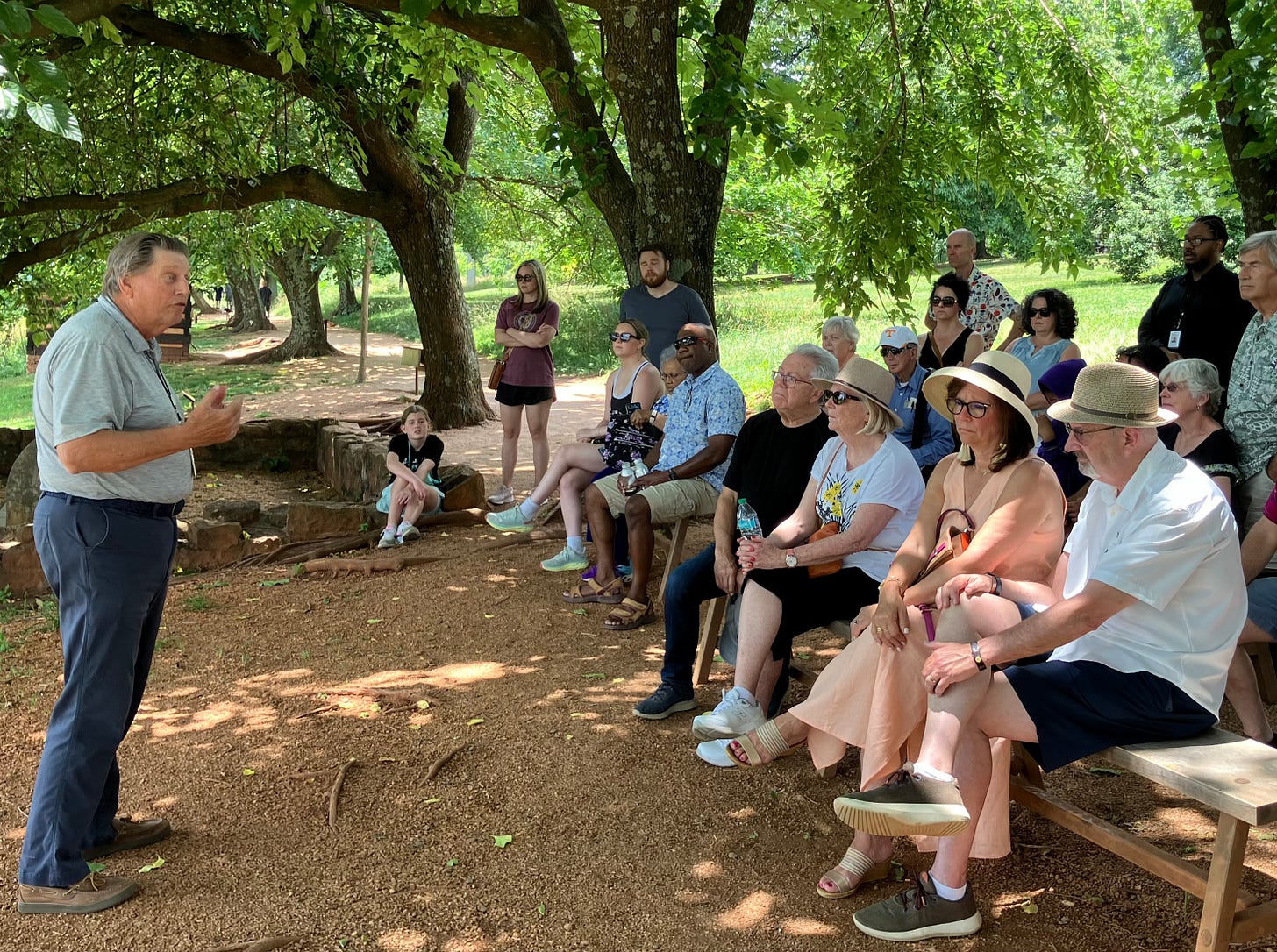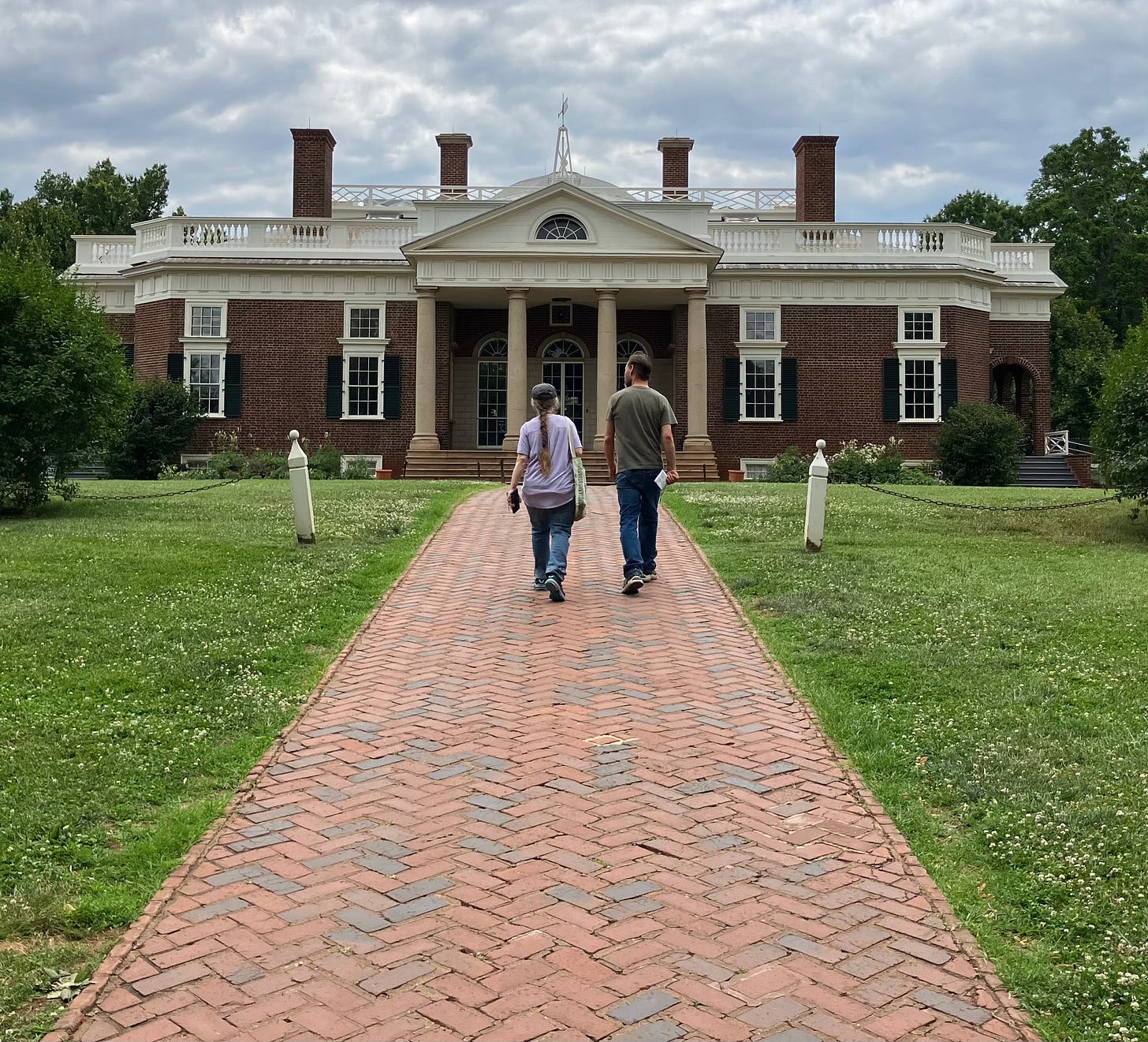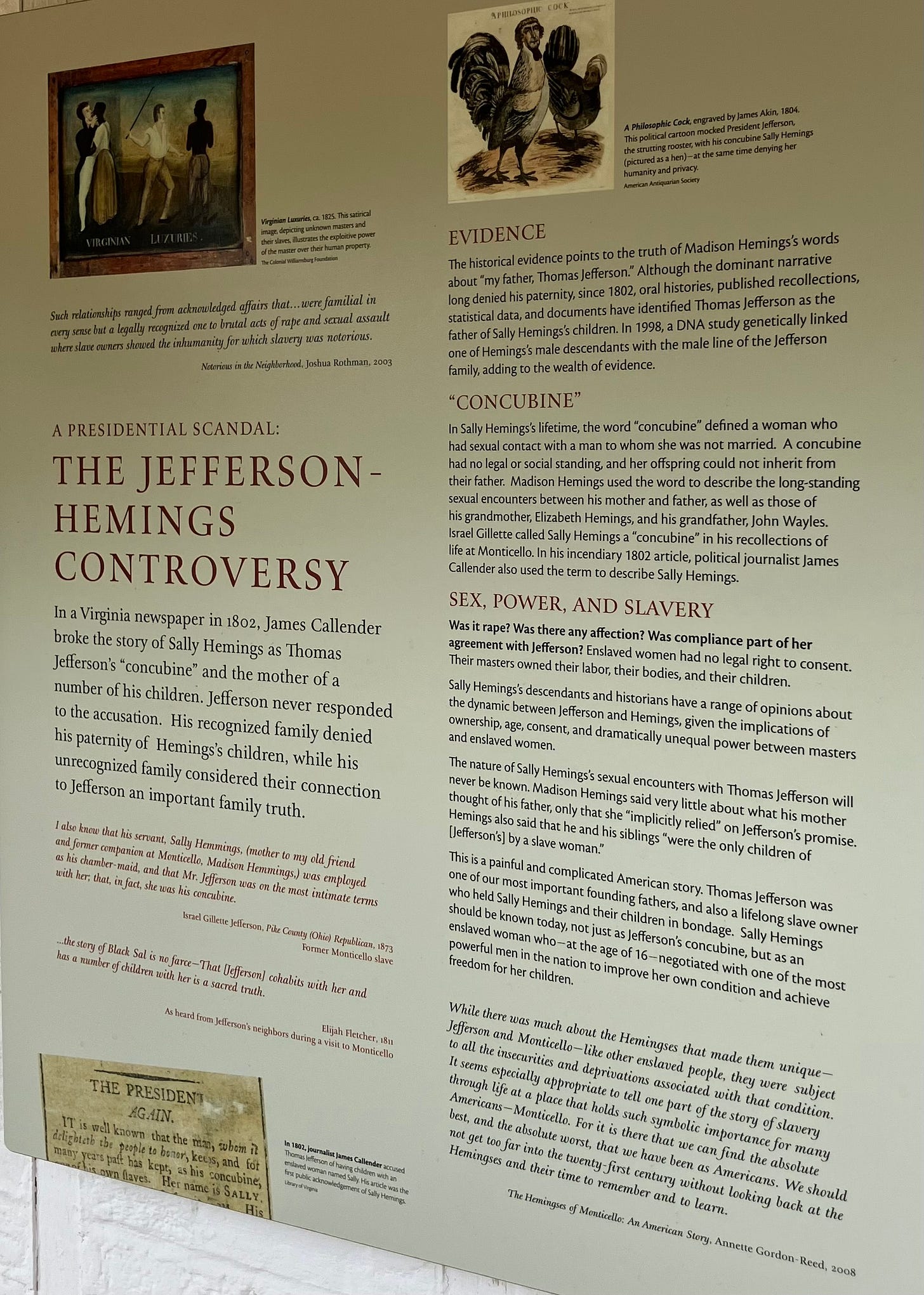Monticello struggles with Jefferson's complicated story
Congress appropriates $10 million for missile defense Pentagon may not want
Please consider supporting The Front Page with a paid subscription: HERE
It was nearly 33 years ago that my wife and I visited Monticello, the iconic home of Thomas Jefferson.
The world has changed.
Monticello has changed, too.
How the third president lived and his use of enslaved peoples on his plantation has become common knowledge.
The story of the slave Sally Hemings as the mother of Jefferson's children has been accepted as fact.

Over the course of 45 minutes during the "Slavery and Monticello Tour" earlier this week, we heard the paradox that is Jefferson's life; how the man who wrote "all men are created equal" in the Declaration of Independence actually enslaved hundreds on his plantation because he did not believed African-Americans were his equal.
Near the end of the tour, one young woman asked an important question, the elephant in the room: Why did it take Monticello - and the Thomas Jefferson Foundation - so long to embrace the reality.
The tour guide hesitated.
He seemed deep in thought, looking for the words.
Maybe, he still did not want to say the wrong thing.
"Well, it is an embarrassment," he finally said. "There is no other way to put it."
It was refreshing to hear.
I stayed afterward to ask a few more questions.
When did the story change?
Was there pushback within the Charlottesville community where the University of Virginia was founded by Jefferson?
The guide offered few specifics. He explained how the story has evolved over the past 25 years, but offered few specifics.
Twenty-four years ago, the Thomas Jefferson Foundation assembled a team of historians and reviewed the DNA evidence that concluded there was a high probability that Jefferson was the father of all of Hemings' children. A few of the historians in the group disagreed and said the claims of Jefferson's paternity were politically driven.
But the reality is that Sally Hemings and Jefferson were linked as far as 1802 when a former Monticello slave told a newspaper that Sally Hemings was employed as Jefferson's chamber maid and that "Jefferson was on most intimte terms with her, that in fact, she was his concubine."
Twelve years ago the Thomas Jefferson Foundation collaborated on a major exhibit with the Smithsonian Institution at the National Museum of American History - "Slavery at Jefferson's Monticello: The Paradox of Liberty."
It was described as groundbreaking.
It addressed Jefferson as a slaveholder.
It documented how the descendants of six families of slaves, including Hemings, that "evidence strongly supports the conclusion that Jefferson was the father of Sally Hemings' children."
The exhibit drew more than 1 million people and eventually was shown around the country.
History was rewritten.
The United States National Park Service and the University of Virginia's Miller Center of Public Affairs changed Jefferson's online biographies, saying that it is widely accepted that Jefferson fathered Sally Hemings' children.
In response, there was pushback.

The Thomas Jefferson Heritage Society was formed in response and argued that Jefferson was not the father of the children and suggested the possibility that Thomas Jefferson's son, Randolph Jefferson and his five children, could also have fathered the children.
That is not the story being told at Monticello today. It addresses the controversy front and center and includes a program on slavery at Monticello.
What is not known, what will never be known was the nature of Jefferson's relationship with Hemings. Over the years, there seems to be efforts to romanticize it, to make it into a love story.
"Sally Hemings's descendants and historians have a range of opinions about the dynamic between Jefferson and Hemings, given the implications of ownership, age, consent, and dramatically unequal power between masters and enslaved women," it is written at Monticello to address the controversy.
The guide told us that when Jefferson died his will called for freeing five slaves, all males of the Hemings family, including two of her sons who were later counted as free whites in the 1830 census.
The records show repeatedly that Jefferson treated the buying and selling of slaves as nothing more than a business and even his final act of freeing five slaves did not necessarily right a wrong.
Joseph Fossett, Sally Hemings' nephew and the blacksmith at Monticello, was one of those freed by Jefferson. But Fossett's wife and 10 children were among the 130 slaves sold at auction after Jefferson's death. Working as a blacksmith over the years, Fossett earned enough money to buy back most of his family.
In retrospect, freeing five of his slaves was hardly an act of humanity.
"This is a painful and complicated American story," the Thomas Jefferson Foundation concludes. "Thomas Jefferson was one of our most important founding fathers, and also a lifelong slave owner who held Sally Hemings and their children in bondage. Sally Hemings should be known today, not just as Jefferson's concubine, but as an enslaved woman who - at the age of 16 - negotiated with one of the most powerful men in the nation to improve her own condition and achieve freedom for her children."
In 2008, Annette Gordon-Reed published "The Hemingses of Monticello: An American Story.
"For it is there that we can find the absolute best, and the absolute worst, that we have been as Americans," Gordon-Reed wrote. "We should not get too far into the twenty-first century without looking back at the Hemingses and their time to remember and to learn."
Monticello is trying to make up for lost time.
Missile defense
Rep. Elise Stefanik's dream is to land a missile defense system to be based at Fort Drum because it will add 600 well-paying jobs to the community.
Congress passed $10 million in funding this past week to help make that a reality.
But it is still unclear whether the Pentagon even wants the new system.
Earlier this year, 7 News in Watertown wrote: "It’s unclear where the project stands. While some say it should happen, Congress has yet to write the check to pay for it."
So 7 News tried to get clarity from Stefanik.
It requested an interview on March 7. Four weeks later it got a statement from Stefanik.
It finally published what it had about the proposed missile system on April 19 with the question about its future left unanswered.
Trump donations
Substack columnist Heather Cox Richardson reminded us in a recent column that Donald Trump raised $250 million from supporters for an "election defense fund" to pay the legal fees to overturn the results of the 2020 election.
But Trump never set up the fund.
The money went to the Save American political action committee founded and controlled by Trump.
The money eventually went to Trump loyalists and other pro-Trump organizations and not toward legal efforts to overturn the election.
Southern Baptists
A year ago, I was visiting my son in New Orleans during the Southern Baptist Convention where it voted that women would not be ministers.
This year, the convention was held in Indianapolis where the group voted to oppose the use of in vitro fertilization.
It has now taken a stand to protect children by limiting how they can be brought into the world when couples have fertility issues.
Journalists threatened
According to the Guardian newspaper, four out of every 10 journalists covering climate change and environmental issues have been threatened because of their coverage.
One in 10 has been subjected to physical violence.
More than 700 reporters and editors from 102 countries were surveyed and found that 4 in 10 were "sometimes" or "frequently" were targeted by people engaged in illegal activities such as logging and mining.
Some 30 percent said they were threatened with legal action as they tried to muzzle free speech.
Ken Tingley spent more than four decades working in small community newspapers in upstate New York. Since retirement in 2020 he has written three books and is currently adapting his second book "The Last American Newspaper" into a play. He currently lives in Queensbury, N.Y.





Complicating your commentary on the general history and legacy of our third US President Thomas Jefferson, I recall that there is an often overlooked fact that Sally Hemings’ father, John Wayles, was also the father of Jefferson's wife, Martha. Therefore, Sally Hemings was a half-sister to Jefferson's wife and was of approximately three quarters English descent.
Martha died during her marriage to Jefferson in 1782. After that Thomas Jefferson had a relationship with “ his slave” Sally Hemings … and she was of course also Jefferson’s sister in law.
A bit confusing but also very interesting stuff. We certainly cannot re-write history but it’s well worth knowing as much as we can about the past in the hope that we can make a better future .